First time I visited Lebanon was in May 2015. I actually didn’t really plan to come to this country, as I had big doubts about safety there. My imagination was drawing the pictures of wars, non-stop terroristic attacks and terrorists themselves running across the country. I still remember how all Russian channels kept on translating the news on Rafik al-Hariri’s (the former Lebanese Prime-minister) murder in 2005. Then the attention was on war with Israel in 2006. And of course there was always a problem of Palestinian and later on of Syrian refugees in Lebanon. So the country with such a bad reputation had a little chance to be in the list of “the most visited destinations in the world”. But destiny always has own plans, doesn’t it? 🙂
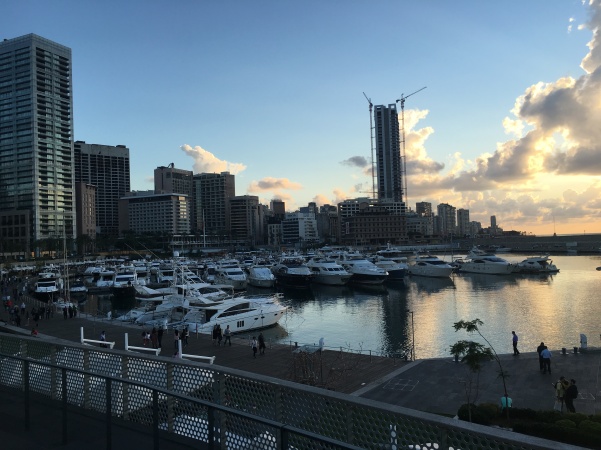
I confirmed my vacation to the Turkish city of Istanbul in April 2015. I didn’t want to stay there more than a week so I had an extra week and was considering other countries nearby. Back then my cousin lived and worked in Beirut, so the decision was made quite quickly. Beirut, I’m coming! Our plane from Istanbul was delayed due to technical reasons, so I had enough of time to begin to be aware of the place I was heading to. BEIRUT with so many problems, conflicts, bomb attacks! MEEEEE, a person with weak nervous system, ultra-high sensitivity and extremely developed imagination! Besides, each person I knew was discouraged by this dubious trip!
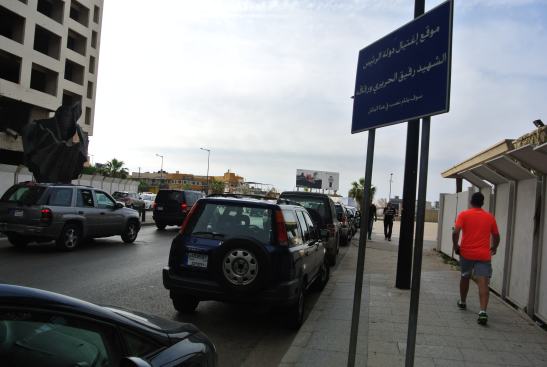
To calm myself down I started to remember how my Arabic literature teacher praised and adored Lebanon. She taught us a lot about its beauty, attractions, music and talented poets! And everything was going perfectly well in my subconscious, but a woman in black burqa, who was sitting next to me on the plane, was deeply frightened to fly. To be honest I have a little aerophobia as well, so my flights are barely enjoyable J But I always control myself and stay still, just not to disturb other passengers. However this woman was a completely different case J Especially since we faced a harsh turbulence all the way to Beirut…
I would like to highlight the spectacular airplane landing in Beirut airport. Those who ever landed in Rafik al-Hariri airport would understand what I mean J When approaching towards Beirut, all that is viewed around is a beautiful blue sea, and at some point even the boats, bobbing on the waves, become clear. Such an incredible beauty! The city shape looms somewhere on the distance as well, but when you are scared and your “plane neighbor” is continuously praying and moaning, then the best choice is to close your eyes and pretend you are somewhere else. But then you open your eyes to see what’s going on, as you feel the pressure difference in your ears. So it feels like the pilot lands the plane right into water! The sea appears from all the sides and unless you sit in the cabin, there’s no way to see the ground. And only when the landing gear begins pounding on a hard surface, you realize that the plane has not fallen and drowned but landed safely. Applause!
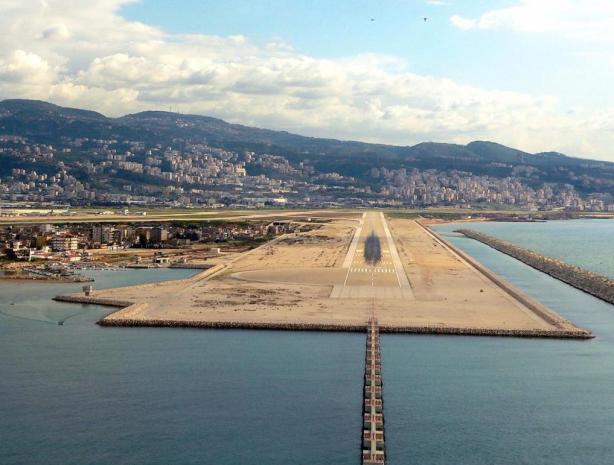
Welcome to Lebanon! Hi, marhaba, bonjour,kifak, ca va?
And now I’m trying to remember what impressed me the most? What surprised me the most? What shocked me the most? I could have said everything, BUT: 1) I have been to Egypt and Syria; 2) I studied the Middle-Eastern region in university; 3) I have a lot of friends and even relatives who live in these counties. So yea, nothing really surprised me. Well, almost nothing 🙂
The first thing any traveler sees when he enters a country is customs. Customs in Beirut seems harsh and strict. But if you haven’t come to the country with so called “artistic visa” (that unfortunately refers to Russian and Ukrainian girls a lot), in other words, if you are not planning to be a strip dancer or a prostitute, then there’s nothing to fear. The best thing is to have a local contact number and address to fill in the immigration card. In case you have no contacts in the country, then you just have to fill the information on the hotel you booked. By the way, the contact has to be real as most of times the Lebanese customs takes the newcomers to the small room and tries to dial the number they provided. All you need is to stay calm and confident. Lebanese customs only seem to be extra serious, in fact they all are really polite and nice guys, smiling at you and wishing you a pleasant stay. At least that was my personal experience.
During my first stay, I booked Port View hotel in the heart of Beirut, located on the street called Mar Mikhail (Saint Mikhail). There was nothing special about the hotel to mention it, classical 3 stars. I can only note that they cleaned my room well and often, but the furniture was quite ancient, I’d even say, antique. Perhaps in was intended by the owner, I don’t know. The street was full of bars and pubs, so in case you seek for peaceful and calm sleep, then it’s definitely not here. Anyways, let’s return to Beirut.
There are contradictory people, who say one thing and do another. Or there is inconsistent food, Dorblu cheese, for example: if you look at it, it’s actually smelly mold, but you do love and crave it. Or let’s say a pop song. You may hate it from the depth of your heart, but sing it all day long nonstop. Why am I telling all that? Well because Lebanon, or I’d say Beirut in particular, is a continuous contradiction, ambiguity, the policy of double standards, talking by the smart terms. Let me explain my point over here.
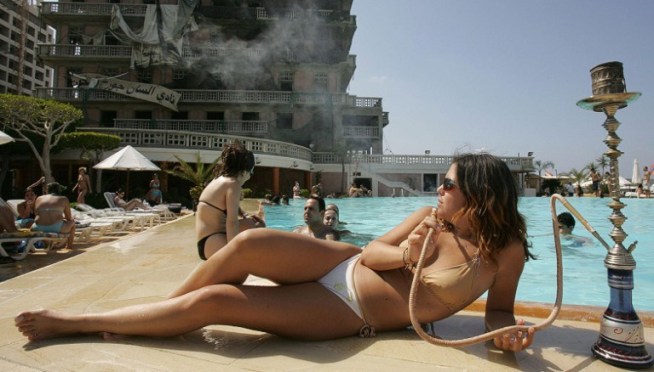
1) The class inequality. I wanted to write the whole tirade about this, but then decided to give just one small example. The city center which is called downtown and Zaitunay Bay, the area along the waterfront next to luxury yachts port, are the spots for Lebanese jet set wearing the most expensive brands on silicone filled body parts. They gather to eat diet dinner in the chic restaurants and to gossip about other girls who just recently tried Botox. But in literally few minutes’ walk to the South of the city you get surrounded by street beggars, people in slippers (aka sha77ata) sitting on the pavement, and big families with kids chewing the food of dubious quality.
2) The territorial division. This question is a little covered in the previous paragraph. It feels like the city is divided by an invisible line. In one area it’s all cool, nice, well maintained, and in another one is such a huge mess. I am not a racist, I am very tolerant and respectful towards all religions, but the fact is that in the Muslim areas (NOT ALL!) it is very dirty, with so many beggars wearing hijabs… I think the reason is in the high percentage of poor uneducated population, plus a large number of refugees from Syria, living in these areas. Again, I did not associate this item with the religion; I just stated the fact, from what I have personally seen. I am not talking here about the garbage issue, which appears to be all over the country. As this subject needs a separate post.
3) Architectural “dissonance”. Beirut was considerably damaged during the Civil War and the proofs can be found at almost every corner. Countless ghost houses, dilapidated, uninhabited with broken windows and shutters, hanging on one hinge. The window of my room in the hotel (it was in the center, as you remember) faced the building, which was completely riddled with bullet holes, which definitely was not the most pleasant sight for a tourist. But, at the same time, the same city center is so luxurious and pretentious, that you feel shy to pass by its streets without the certain dress code. Here is sparkly and gorgeous Four Seasons hotel. Now turn your head left, a bit more left. Aha! Can you see fully destroyed building remains? It traces the assassination on the former Lebanese Prime-minister Rafik al-Hariri in 2005. The explosion was so powerful with many people dead or wounded. And almost the entire central part of Beirut has such “stories to tell”. Strange and sometimes scary…
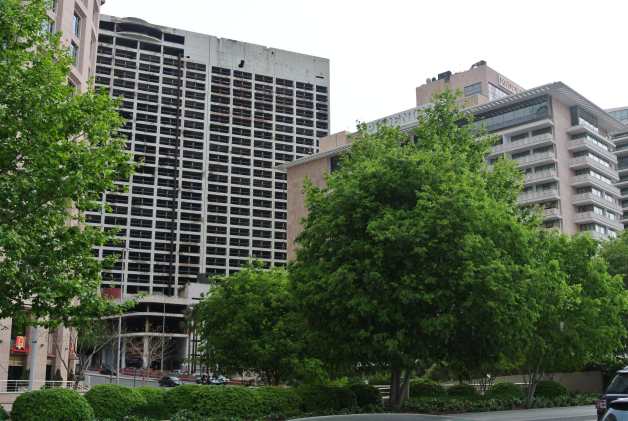
4) Weapons and children. There are army representatives all over Beirut. I wasn’t used to that living in Moscow, therefore I didn’t feel comfortable about their presence on the streets. To say more, I was frightened to the max J So walking by the Corniche, I met the whole group of armed people in military uniforms. I immediately began to look for ways to escape as my survival instinct whispered to me, “Ruuuun”. But then one man from the group stopped in front of a little girl, leaned towards her and they started playing and laughing. Looking at the man in uniform with the eyes full of love, the child touched his weapon, and received a candy from him in return. And all of his companions were touched by the view. And me… At that point I didn’t want to run anywhere anymore… Later I was told that Lebanese army soldiers are much respected people. With the meager salaries they are paid and all the internal and sometimes external risks they face, each of them selflessly defends his country. Every child knows that in Lebanon!
5) Religion and pubs. There are so many religious groups and subgroups on such a small territory of Lebanon. Churches and mosques are sometimes built right next to each other in Beirut. Both Muslims and Christians in Lebanon are highly religious; unlike they are in Russia for example (speaking of the majority of young generation in particular), which is definitely the result of Soviet Communistic past. In Lebanon every Christian has a cross on the car window, or an image of Maronite Saint Charbel on the key chains, together with bracelets and necklaces. Some even tattoo their bodies with the images of Jesus or Saint Mary. Muslims also revere their traditions. But when the sun goes down, Lebanon turns into a massive party spot for people of all ages and statuses. Lebanese are seriously biggest party animals ever! They drink a lot, they dance a lot, sing, and laugh loud. There are restaurants and clubs everywhere! A good example of the mixture of religion and love towards partying is SAINT Mikhail street in Beirut filled with all kinds of bars and pubs J
That’s how I viewed Beirut during my first arrival. I was left with extremely mixed and uncertain feelings about it. And I still am, that’s why my husband and I rarely go there. However, I have a few favorite streets and places in Beirut, representing historic and colorful Mediterranean-Middle eastern side of the city. But we’ll talk about it another time.


